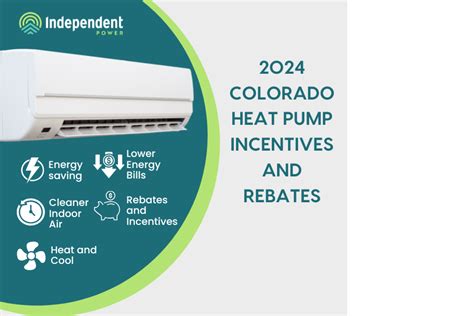As the effects of climate change become more apparent, many states are looking for innovative ways to promote energy efficiency and reduce greenhouse gas emissions. Colorado has taken significant strides toward environmental sustainability, particularly through the implementation of heat pump rebate programs. These initiatives not only help homeowners save money but also play a crucial role in reducing the state’s carbon footprint. In this article, we’ll explore how Colorado’s heat pump rebates are changing the game and making energy efficiency accessible to everyone.
Understanding Heat Pumps
Heat pumps are devices that transfer heat from one place to another, functioning effectively for both heating and cooling. Unlike traditional HVAC systems that rely on combustion, heat pumps utilize electricity to move heat, making them more energy-efficient. In Colorado, where winters can be harsh and summers can be sweltering, heat pumps are an excellent choice for year-round climate control.
The Role of Rebates
Rebates are financial incentives offered by governments or utilities to encourage the adoption of energy-efficient technologies. Colorado’s heat pump rebate program aims to alleviate upfront costs associated with installing these systems, making them more accessible for homeowners. By offering rebates, the state supports its goal of reducing greenhouse gas emissions while promoting economic growth.
Financial Benefits of Heat Pumps
The initial cost of purchasing and installing a heat pump can be a barrier for many homeowners. However, Colorado’s rebate program helps mitigate this barrier by providing significant financial incentives. Depending on income levels and specific systems installed, homeowners can receive substantial reimbursements that can greatly reduce the overall financial burden of transitioning to a heat pump.
Moreover, heat pumps are renowned for their energy efficiency. They can significantly lower energy bills compared to traditional HVAC systems, providing long-term savings that add up over time. Many users find that their energy costs decrease after making the switch, often recouping their investment within a few years.
Environmental Impact
The environmental impact of heat pumps cannot be overstated. Traditional heating methods, like gas furnaces and oil-fired boilers, contribute significantly to greenhouse gas emissions. In contrast, heat pumps operate using electricity and have the potential to be powered entirely by renewable energy sources. Colorado’s commitment to increasing its share of renewable energy makes heat pumps an even more logical choice for eco-conscious homeowners.
Community Engagement and Education
Understanding heat pumps and their benefits is crucial for maximizing Colorado’s rebate programs. Community engagement initiatives play an essential role in educating residents about energy efficiency and the advantages of heat pumps. Various local workshops, informational webinars, and partnerships with contractors can further demystify heat pump technologies and installation processes. The more informed homeowners are about the options available to them, the more likely they are to take action.
Advocacy and Future Prospects
Advocacy groups in Colorado are working tirelessly to enhance the heat pump rebate program and promote broader adoption of energy-efficient systems. By lobbying for increased funding and expanding outreach efforts, these organizations play a critical role in ensuring that all Colorado residents have access to the benefits of heat pumps. The future looks promising as more people become aware of energy efficiency and actively seek sustainable solutions for their home heating and cooling needs.
Challenges and Considerations
While the benefits of heat pump systems and rebates are compelling, several challenges remain. For instance, some homeowners may worry about the performance of heat pumps in extremely cold temperatures. However, advancements in heat pump technology have improved their efficiency in colder climates, making them a viable option for almost every region in Colorado.
Another consideration is the need for proper installation and maintenance. It is crucial to engage qualified contractors familiar with heat pump technologies to ensure optimal performance. Colorado is investing in training programs for technicians to enhance the skill sets necessary for effective installations, which should alleviate any concerns about finding qualified professionals.
Conclusion
Colorado’s heat pump rebate program is a game-changer for homeowners and the environment alike. By offering significant financial incentives for energy-efficient technologies, the program makes it easier for residents to transition to heat pumps, thereby reducing energy costs and lowering greenhouse gas emissions. With growing awareness, community engagement, and ongoing advocacy, the state is on a path to not only enhance its energy efficiency but also to build a more sustainable future. The combination of economic and environmental benefits makes heat pumps a smart choice for Colorado homeowners looking to take control of their energy use and contribute to a healthier planet.
FAQs
1. What are heat pumps, and how do they work?
Heat pumps are devices that transfer heat from one place to another, effectively providing both heating and cooling. They work by absorbing heat from the outside air or ground and transferring it indoors during winter, and vice versa in summer.
2. What is the purpose of the heat pump rebate program in Colorado?
The heat pump rebate program aims to incentivize homeowners to install energy-efficient heat pump systems by offering financial rebates that help reduce the upfront costs associated with installation.
3. How much can I save with a heat pump?
While savings vary based on energy use, many homeowners report a reduction in energy bills by up to 50% after switching to heat pumps compared to traditional HVAC systems.
4. Are heat pumps effective in cold weather?
Yes, modern heat pumps are designed to operate efficiently even in colder temperatures, thanks to technological advancements that have improved their performance in various climate conditions.
5. How can I participate in the heat pump rebate program?
To participate, homeowners should check eligibility requirements, consult with a qualified contractor about the installation of a heat pump, and apply for the rebate through the appropriate Colorado state or utility program.
This HTML code provides a structured article with headings, paragraphs, and FAQs related to Colorado’s heat pump rebate programs.
Download Colorado Heat Pump Rebates
